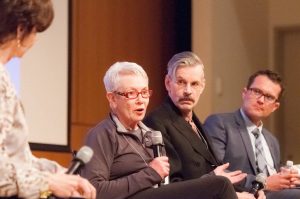Published by the Independent Voter Network (IVN) – April 5, 2017
Five years ago, outside of the public eye, a conflict flared inside the inner circle of Democratic Party power.
Simply put, it was this: should the Obama re-election campaign find a way to make an explicit appeal to independent voters? Five years ago, the answer was no. I know this because I was part of the discussion, though an outsider to it, whose counsel was firmly rejected. And though Obama won reelection in 2012 while losing independents to the GOP, the strategic decision to double down with the Democratic base and turn away from independents, the emergent engine for reform of the political system, laid the groundwork for Democratic defeat in 2016.
Last week, Bernie Sanders, the curmudgeonly crusader of the American left, called out his party’s failure to make those links: “Let me just say this, the Democrats will not succeed unless it attracts many, many millions of independents. The number of people who are now moving in the independent direction, as opposed to Republican and Democrat — it is growing. So if the Democrats are going to be successful, in fact that party is going to have to appeal to a whole lot of independents.”
Yes! But what does that mean, circa 2017, with the Democrats in opposition party mode trying to find a voice in a chaotic and uncertain Washington with a volatile and unpredictable Trump in the White House?
When I saw Bernie on MSNBC’s Morning Joe issuing this challenge, I called Charlotte Scot, an avid Bernie supporter in Connecticut and formerly the director of communications for the Democratic National Committee when Jimmy Carter was president. Charlotte had just appeared on stage with me at the National Conference of Independents, sharing her experience of how the power and energy of the Bernie movement had been dissipated by the party regulars. Charlotte became an independent and the audience cheered her decision.
She had seen Bernie on Morning Joe too and had already been tweeting about it. I asked her how she thought this fit in to the DNC’s latest efforts to restyle itself under Tom Perez’s leadership. “I don’t buy it”, she said. “The DNC does not want to change. It is already soliciting contributions from lobbyists, it may have asked all staff to resign but, it also just hired many former members of Clinton’s staff. They are putting on a public show. Keith Ellison is now a deputy Director, but the party regulars appear to be running the show. These are the same people who let Donald Trump become president by favoring fundraising over hog raising farmers. By shunning every day Americans in favor of Hollywood elite. Bernie understood the people who were hurting but, how could the DNC ever support a candidate who doesn’t even own a tuxedo? Bernie is an outsider. He needs to run for president as an independent!”
We talked for a while and I told her the sad story of the Obama campaign in 2012, how I’d met with David Axelrod and David Simas to offer them the opportunity to rebuild Obama’s 2008 independent coalition, the one that had been squandered once he was elected, and the Pelosi Democrats started to set the agenda. This would require, I told them at the time, giving legitimacy to the fact that 42% of the country were not aligned with a party and demonstrating that the president understood why and respected our choice.
For a time, Axelrod and Simas engaged, asking for help on how to link reforms like including independent appointees on the FEC to social issues, like housing and jobs. But ultimately, they explained, the party stakeholders would not agree to terms, and so this course was abandoned.

Charlotte Scot speaks at “Crossroads for an Independent America.”
Charlotte, a veteran of the Carter campaign and the Carter White House, remarked “Jimmy was an outsider and the party didn’t like that. One DNC member quipped, ‘The Beverly Hillbillies come to Washington.” Had the Democratic Party supported President Carter we would have had clean green energy 40 years ago. After the 2016 Democratic fiasco the independent movement is even more vital.”
True that, I told Charlotte. We are the coalition of outsiders. And maybe, just maybe, Bernie is coming to see that he needs to support the outsiders in order to pursue his own goal of remaking the Democratic Party. Whether he can get the Democratic leadership to go along is another question.
Looking toward the 2020 presidential election, independent voters – now 44% of the country- have three main concerns. Can the players in independent politics find a way to come together to create a unified strategy, including a unified independent presidential candidacy? Can the independent movement force the Democratic and Republican Parties to guarantee voting rights to the nonaligned in the 2020 primaries and caucuses?
Obama won the nomination in 2008 because enough state primaries allowed independents to vote to power his win over Hillary Clinton. Bernie, likewise, had huge appeal to independents and was forced late in the primary season to speak out for open primaries, though by then it was too late for a path to the nomination.
Third, can the movement propel reforms of the political process sufficient to transfer political power from the parties to the people?
Bernie, great to see you speaking out for a coalition of outsiders! Let’s sit down together and talk about how to bring our movements together. The tide is turning toward political independence. We felt the Bern. Now, let’s make the turn.